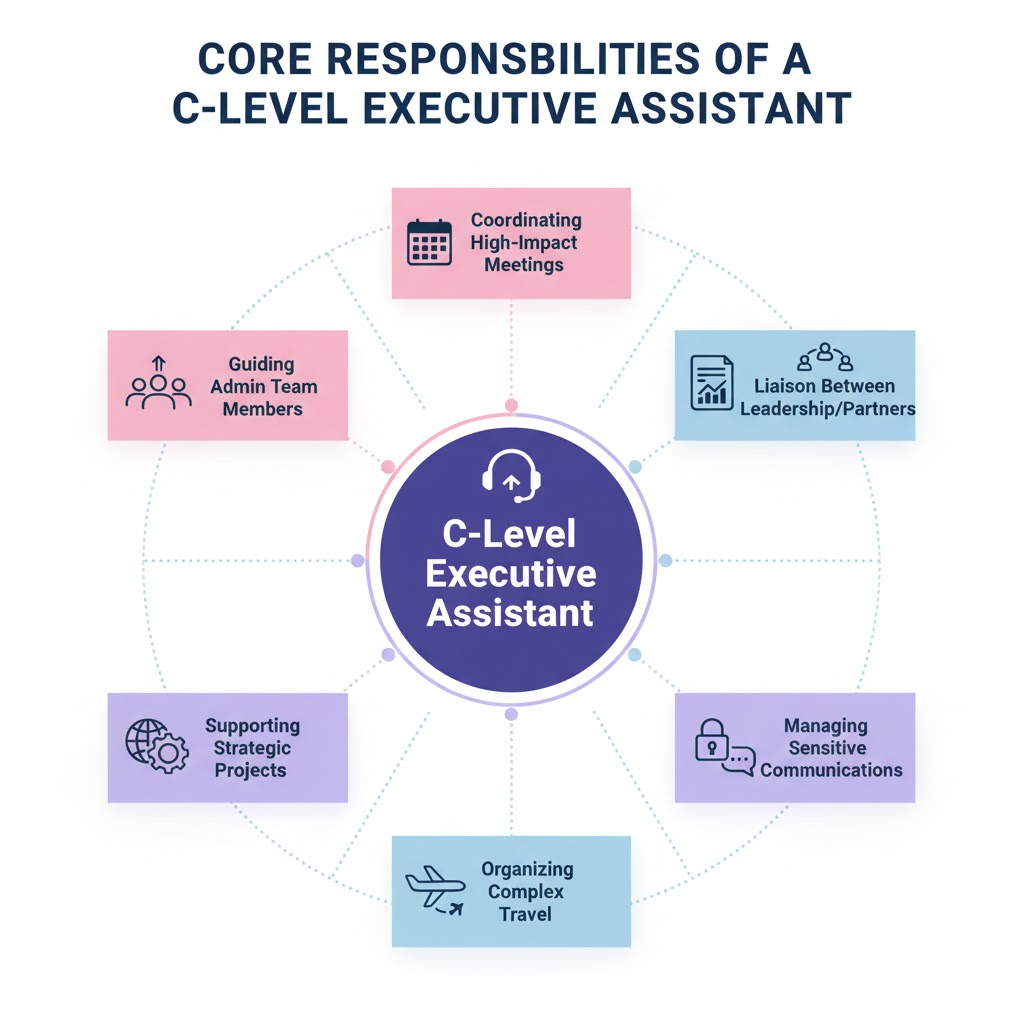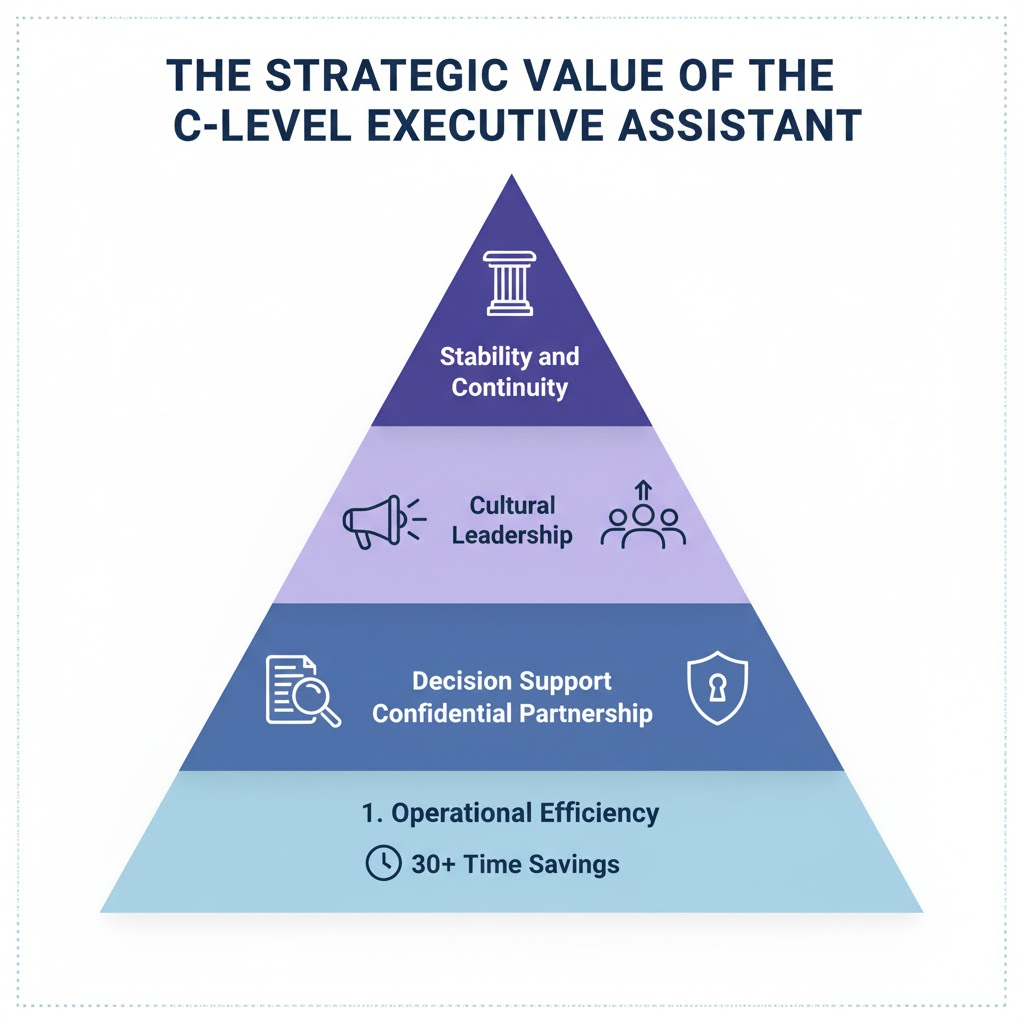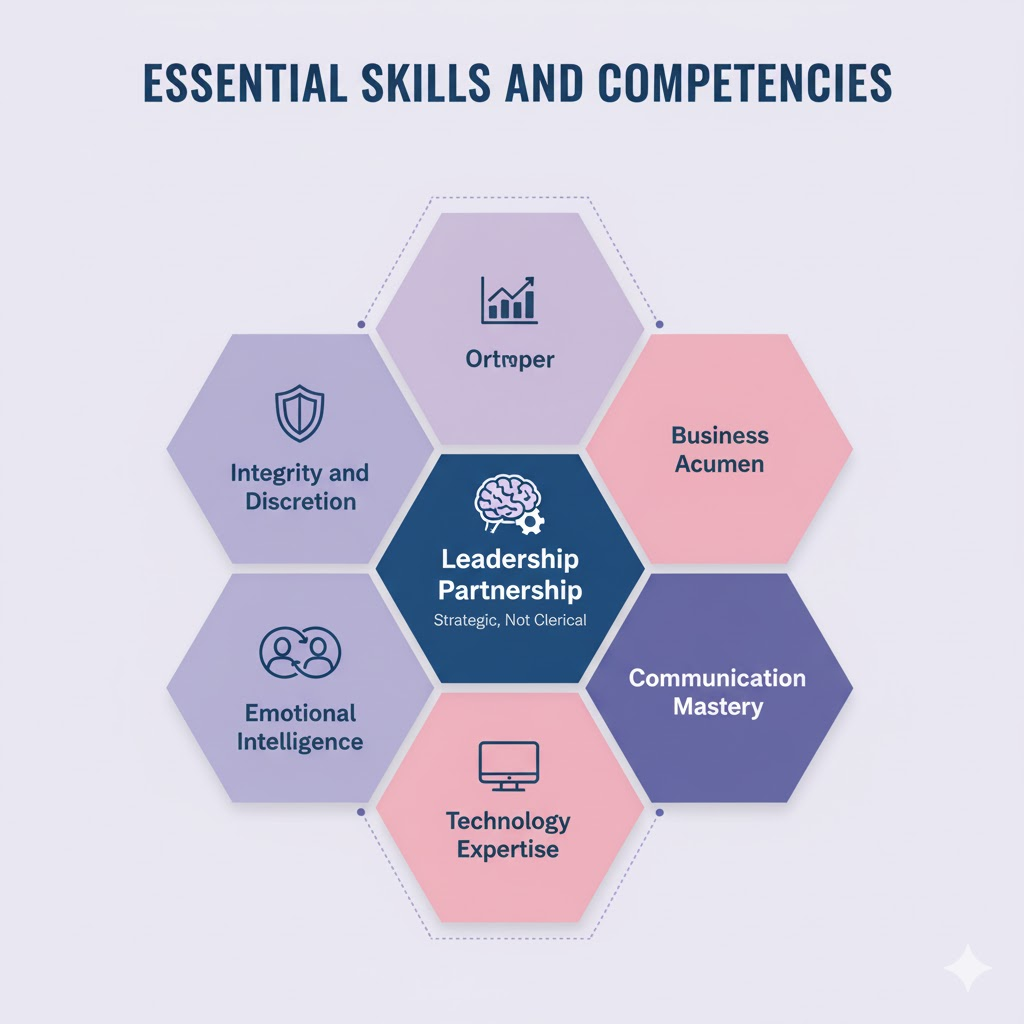Introduction: The Quiet Power Behind Every Successful Leader
Behind every high-performing executive is someone who brings order to chaos, turns decisions into action, and ensures priorities become progress. The C-level executive assistant.
Far beyond administrative scheduling, these professionals shape the rhythm of leadership. They act as trusted advisors, strategic operators, and communication hubs who allow executives to focus on what matters most: growth, innovation, and people.
As organizations strive to stay agile in a hybrid, data-driven world, the modern C-level executive assistant has become indispensable. This guide explores how the role has evolved and how Berry Virtual helps companies build executive support systems that empower leadership at every level.
What Is a C-Level Executive Assistant?
A C-level executive assistant supports senior executives such as the Chief Executive Officer, Chief Operating Officer, or Chief Financial Officer.
Unlike a traditional administrative assistant, this position demands deep organizational insight and business acumen. The C-level assistant acts as the executive’s right hand, filtering communication, anticipating needs, and driving execution with precision and discretion.
Core Responsibilities Include:
- Coordinating and prioritizing high-impact meetings and leadership commitments
- Preparing executive briefs, presentations, and board materials
- Acting as a liaison between leadership, departments, and external partners
- Managing sensitive communications with professionalism and confidentiality
- Supporting strategic projects and cross-functional initiatives
- Organizing complex travel and logistics for global operations
- Guiding or mentoring other administrative team members
Professionals placed through Berry Virtual undergo advanced training in leadership support, business communication, and confidentiality to deliver excellence under high-level expectations.

The Strategic Value of the C-Level Executive Assistant
1. Operational Efficiency
Executives supported by skilled assistants regain significant time for leadership. With structured calendars and streamlined communication, productivity can rise by 30% or more.
2. Decision Support
Executive assistants analyze, prepare, and present information that accelerates decision-making. Their understanding of context and priorities makes them invaluable during high-stakes discussions.
3. Confidential Partnership
The assistant is often a leader’s closest professional confidant. Berry Virtual’s assistants are trained to handle confidential matters with integrity and emotional intelligence.
4. Cultural Leadership
Executive assistants model professionalism, setting the tone for team communication and culture. They bridge the gap between leadership intent and organizational execution.
5. Stability and Continuity
During transition or expansion, the C-level assistant ensures operational consistency, maintaining executive rhythm and preserving institutional memory.

Essential Skills and Competencies
The best C-level executive assistants balance analytical precision with emotional awareness.
Key traits include:
- Integrity and Discretion: Absolute confidentiality and reliability
- Business Acumen: Understanding market drivers, KPIs, and executive priorities
- Communication Mastery: Clear, concise, and high-standard correspondence
- Emotional Intelligence: Reading context and managing relationships gracefully
- Technology Expertise Proficiency in CRMs, scheduling systems, dashboards, and collaboration platforms
- Composure Under Pressure: The ability to manage complexity with calm precision
- Leadership Partnership: Viewing the role as strategic, not clerical
Every Berry Virtual assistant is trained to operate with these principles, aligning performance with executive vision.

Career Path and Professional Growth
A C-level executive assistant role can evolve into leadership-adjacent positions such as Chief of Staff, Operations Manager, or Executive Office Director.
Professionals typically have 5 to 10 years of high-level administrative or project management experience before stepping into C-suite support.
At Berry Virtual, assistants receive continuous coaching and upskilling in leadership communication, workflow optimization, and business analysis, preparing them to grow alongside the leaders they support.
Trends Defining the Role in 2025
1. Remote and Hybrid Executive Support
Executives operate globally, often across time zones. Berry Virtual specializes in matching executives with assistants adept at hybrid workflows and cross-border coordination.
2. AI Integration and Productivity Tools
Technology automates administrative repetition, while human assistants manage strategic execution. Berry Virtual trains its assistants to leverage AI tools effectively, without losing the personal touch that executives value most.
3. Expanded Strategic Scope
Modern executive assistants oversee communications, reporting, and change initiatives. The line between assistant and operations partner continues to blur, a shift Berry Virtual actively supports.
4. Data Security and Compliance
Data privacy is non-negotiable. All Berry Virtual assistants are trained on compliance protocols like GDPR and HIPAA, ensuring client confidentiality and legal standards.
5. Globalization and Cross-Cultural Competence
C-level assistants must now navigate international communication, cultural nuance, and cross-border logistics skill sets central to Berry Virtual’s managed staffing model.
How to Hire a C-Level Executive Assistant
1. Define the Role Clearly
Decide whether the focus is operational management, project coordination, or executive communication. Clear scope drives hiring precision.
2. Evaluate More Than Technical Skills
Prioritize judgment, adaptability, and discretion, the soft skills distinguishing world-class assistants from task managers.
3. Seek Personality and Strategic Alignment
The best assistant complements an executive’s communication style, pace, and leadership philosophy.
4. Ensure Oversight and Training
Partnering with a managed provider like Berry Virtual ensures every assistant receives continual development and performance feedback.
5. Build for Longevity
An enduring executive-assistant relationship becomes one of trust, rhythm, and mutual respect. Berry Virtual facilitates lasting matches that grow with your leadership journey.
The Difference Between an Executive Assistant and a C-Level Executive Assistant
While both roles offer vital support, a C-level executive assistant operates at a higher strategic tier. They don’t just organize, they anticipate, align, and influence.
An executive assistant ensures smooth operations; a C-level assistant ensures organizational focus, clarity, and accountability, serving as the executive’s strategic ally.
Berry Virtual specializes in sourcing and developing this caliber of assistant for leaders who expect excellence.

Conclusion: Leadership’s Most Strategic Partner
C-level executive assistants are not just support staff but the operational backbone of leadership success.
Partnering with Berry Virtual gives executives access to elite professionals who combine skill, discretion, and strategic understanding to keep leaders focused on what truly matters.
In 2025, agility defines success, and with Berry Virtual, your leadership never misses a beat.
Frequently Asked Questions
1. What defines a great C-level executive assistant?
A great assistant anticipates needs before they arise. They manage time, communication, and relationships with precision qualities that Berry Virtual cultivates through specialized leadership support training.
2. Can a C-level executive assistant work remotely?
Yes. Many executives now rely on fully integrated remote assistants through digital platforms. Berry Virtual provides secure communication systems and workflow alignment to make hybrid collaboration seamless.
3. What experience should a C-level executive assistant have?
Ideally, 5–10 years of senior-level experience, with demonstrated scheduling, communication, and project management expertise. Berry Virtual matches assistants to executives based on skill, knowledge, and cultural fit.
4. How is a C-level executive assistant different from a Chief of Staff?
An assistant manages communication, scheduling, and follow-up, while a Chief of Staff leads strategic initiatives and cross-departmental alignment. Many of Berry Virtual’s top assistants evolve into Chief of Staff roles over time.
5. Why hire through a managed provider like Berry Virtual?
Because you gain structure, consistency, and accountability, Berry Virtual recruits, trains, and oversees every assistant, ensuring confidentiality, quality control, and measurable impact from day one.

.avif)


